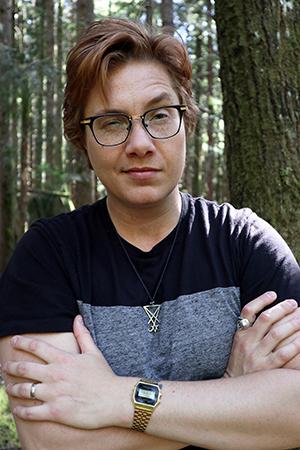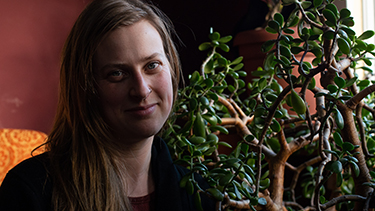The Horrible & the Sublime: Mieke deVries in Conversation with Andar Wärje

Andar Wärje, whose story “Hopeful Materials: A Nordic Trans Man's Response to Ibsen” appears in The Malahat Review’s spring issue #214, discusses endings vs. beginnings, empowerment in digging into the darkness, and new things growing from the decay of the old in his Q&A with Malahat Review Fiction Board intern Mieke deVries. Read an excerpt of "Hopeful Materials" here.
Andar Wärje is a queer and trans writer from rural interior British Columbia. His work has appeared in magazines including The Literary Review of Canada, Grain, Room, Descant, CV2, The Dalhousie Review, Open Minds Quarterly, carte blanche, and Event, and anthologies such as Rocksalt (Mother Tongue Publishing) and Cleavage (Sumach Press). Andar has placed in the Vancouver Writer’s Festival’s annual contest, received an Emerging Writers grant from the Canada Council for the Arts, and designed writing courses for UBC. He is a survivor of long-term intimate partner violence, and his brain plays host to numerous diagnosed mental illnesses including OCD, PTSD, and depression. He lives with his wife and several animal familiars on a mountain somewhere rainy. He believes strongly in the healing power of stories. https://www.andarwarje.com/
“Hopeful Materials” starts with an Ending, and finishes with a Beginning. Why structure the story this way? Is structure something you plan when you write fiction, or does it happen more spontaneously as you write?
I don’t speak for other trans people, but for me, the first stages of transitioning felt more like an ending than a beginning. First and foremost, the end of a certain kind of suffering. I had known only pain and self-hatred prior to coming out. Beyond that, I grieved the loss of a girl I still hold great respect for—a survivor of trauma, violence, and abuse. A brave fighter. I will not see her again in the mirror, or when I look down at myself. She has gone, and her birth certificate has been shredded, for my sake. I have built myself of some combination of the thoughts, memories, body parts, and hopes she gave me. It’s a very messy process, feeling yourself transform. I think most new things grow from the soil and decay of the old. The falling apart. Starting fresh isn’t the same as starting from nothing. I wanted this story to emphasize that.
I’ve been writing poetry a lot longer than fiction, so I’d say structure and language probably come to me more “naturally” than plot. I don’t perceive a huge separation between form and substance while writing. I try to let them interact organically and then build on those connections when I’m editing.
What was the inspiration for this story? How did the story come into the shape we see it in now? Did it change much as you revised it?
My first inspiration was the strong impulse to describe my own trans experience. The story isn’t autobiographical, but it’s hugely informed by my own life. I think the more trans people tell their own stories, the more nuanced our understanding of trans identity, insight, and power will become. Lack of representation leads to flattened, reduced narratives about marginalized voices instead of by them. I mostly wanted to tell a story about being me.
My other inspiration was the play Peer Gynt by Henrik Ibsen. It tells the story of a man deemed unfit for heaven or hell because he’s failed to distinguish himself as either good or evil. He’s done some good, but just enough to cancel out his bad deeds. He’s essentially a wasted man, and must be thrown back in the cosmic “button-mould” to be recycled into something more worthwhile. Ibsen’s 1867 play is a searing indictment of the “modern” man who aims for mediocrity, more concerned with what he can get away with than how he can serve his purpose.
My story, written in 2020, is about failing as a man in a different way. As a trans man, I have often felt like a failure and wished I could go back in the mould and be melted down for another try. My main character is a trans man who feels broken and incomplete, and because of that feeling, remains that way. Only when he is able to embrace his own imperfections and see himself as sacred—no messier or less divine than any other being—is he able to escape this endless cycle of failure and pain.
This story came out pretty much the way you see it on the page now. It was sort of hovering in the wings, I think, waiting to be told.
Who and what are your biggest influences? What are you currently reading?
The weirder the better. I consume horror voraciously, everything from the lowbrow to the sublime, artsy, and erotic. A lot of my experience of life was sort of nightmarish for a long time, and I’ve found empowerment in digging into the darkness to see what’s really there. For a long time I thought I couldn’t write fiction; then I realized I just needed to be writing shamelessly weirder fiction than I was trying to write. “Hopeful Materials” isn’t horror per se, though the experience it describes is partly horrible. Some mix of the horrible and the sublime is pretty much what you can expect from my writing.
I’ve had my mind blown recently by Ghost Summer by Tananarive Due, My Best Friend’s Exorcism by Grady Hendrix, and This Wound is a World by Billy-Ray Belcourt.
What are you working on right now? Is there anything readers should look out for?
I’m currently working on my first book of stories and my first full-length poetry collection simultaneously. I took a long hiatus from writing (while trauma and life and transition happened), so I’ve been working on the poetry book for approximately 15 years longer than the stories. I’m still crafting my online presence to reflect my new name, gender, face, etc., so please do seek me out via the internet to read more weirdness! A website is being built as we speak. I’ll even show you how to pronounce my Swedish last name on there.

Mieke deVries
* * * * * * * *









